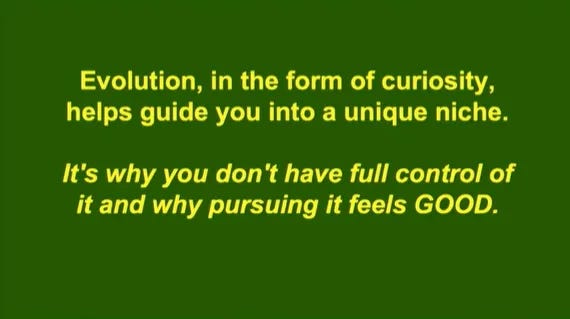The Deload explores my curiosities and experiments across AI, finance, and philosophy. If you haven’t subscribed, join nearly 2,000 readers:
Disclaimer. The Deload is a collection of my personal thoughts and ideas. My views here do not constitute investment advice. Content on the site is for educational purposes. The site does not represent the views of Deepwater Asset Management. I may reference companies in which Deepwater has an investment. See Deepwater’s full disclosures here.
Additionally, any Intelligent Alpha strategies referred to in writings on The Deload represent strategies tracked as indexes or private test portfolios that are not investable in either case. References to these strategies is for educational purposes as I explore how AI acts as an investor.
The Gateway to Obsession
“Please ask yourself, and I do mean, please ask yourself--this is not a rhetorical device. Can you force yourself to be interested in something?”
Tom Morgan, who writes
, presented the question at this year’s Sohn Conference. Sohn is a gathering of some of the world’s best investors to pitch favored investment ideas. We can’t invest in forcing ourselves to be interested in something, so why would a room of investors care about it?Putting Morgan’s intent into my own interpretation — investors are interested in being interested because when we get interested, we gain knowledge, and since interest is so individualized and so fleeting, being interested in something is a competitive advantage.
Many of the best investors are the most curious. See Charlie Munger’s career.
Curiosity is a gateway to interest. Interest is a gateway to obsession. Obsession is a gateway to conviction. Conviction is only needed for uncomfortable ideas. Uncomfortable ideas that end up being right generate extraordinary outcomes.
My two rules for cultivating curiosity are do it and share it.
This path from curiosity to conviction is the only path to doing extraordinary things in any field, but investing is the clearest application of the need for uncomfortable conviction. The markets by definition are a reflection of consensus. You must believe something wildly different from the herd to obtain a result wildly different from the herd.
Reverse engineering the process, no one takes action on an uncomfortable idea without conviction. You can’t find conviction without obsessing about something so you understand something about that thing that other people don’t. And you can’t obsess about something you don’t have a curious interest in.
So, can we force ourselves to be interested in something?
No.
We can force ourselves to try something, and we should keep trying things until we find conviction in some uncomfortable idea.
Someone Else Will Do It
To act on an uncomfortable idea is to build something new, often a business.
Anyone starting a business is bound to get the question: “Why doesn’t [insert giant company] just do it?” Many times it’s not even phrased as a question. Giant company X is going to do your idea. You don’t stand a chance.
I’ve heard that a hundred times about Intelligent Alpha (update below). Everyone in investing is coming to use AI, and they’ll crush you. Maybe so.
Every startup is a David and Goliath situation. The David startup is fueled by passionate curiosity that’s built conviction about an uncomfortable idea. Goliath has the resources and distribution to steal ideas rather than come up with his own. Who wins?
It depends.
Sometimes Goliath can leverage sheer size and might into subsuming some new market opportunity, but every David gets asked why Goliath doesn’t just take his idea, so Goliath has a lot of ideas to choose from. He can’t go after all of them. The non-obviousness of a good startup idea makes the idea seem even less appealing to Goliath. That’s one reason why obvious ideas have less alpha. More competition, including from the big guys.
David’s secret weapon is a unique insight about the world that Goliath doesn’t have. It’s the rock in the sling. The only way to get that unique insight is through being so interested in something that you know more about it than anyone else.
I’ve used the example of Kobe Bryant to describe what obsession looks like. His obsession with basketball granted him a conviction that most other professional basketball players never have: I can be the best in the world. His study of the game gave him the tools to deliver on it.
Think about how crazy that is. There are hundreds of players in the NBA. A couple hundred regular starters, and every starting caliber player is incredibly talented.
How many actually think they can be the best player in the world? Maybe a dozen?
A lot of guys might say they want to be the best, maybe even think it, but if they’re not obsessed, deep down inside they know they can’t be.
This analogy extends to everything else in the world. Who can be the best hedge fund manager? Only the guys who are obsessed like Steve Cohen or Stan Druckenmiller or David Tepper. Who can be the best bodybuilder? Read about Arnold’s obsession. There might be guys with better genetics, smarter guys, guys with more resources — the Goliaths — but if they don’t have obsession, then David has a chance.
There’s a pyramid of competition for everything. That’s the nature of humanity. The top of the pyramid is always dominated by the obsessed. The near top is filled with the naturally gifted or resource rich. The rest of the pyramid is everyone else.
Curiosity is the only path to the top of the pyramid.
Curious Machines
Morgan’s talk about curiosity didn’t just strike a chord with me because I’ve found a deep curiosity in using AI to pick stocks. It also struck me regarding another underlying question that ties AI and humans together.
If evolution’s answer for where we should direct our time is curiosity, can AI be curious? Does it need to be curious?
Maybe AI’s seeming lack of curiosity is what will ultimately prevent it from ever achieving human-like intelligence, which I view as different from human-level intelligence. Human-like means you think and learn like a human. Human-level means you’re capable of understanding situations in the real world and able to act on them like a human. The two concepts are distinct.
I think AI will reach human-level intelligence soon if it’s not already there, but to learn something on your own, you have to be curious. And it’s not apparent that machines have an innate curiosity. Instead, robots must be demanded to learn something by humans who are curious whether the robot can do it.
Creativity, community, and empathy were the things that I used to believe would permanently separate humans from machines, but maybe it’s actually curiosity. Curiosity is as close to a tangible soul or spirit that we have — an innate and invisible force that moves us. Those who never harness it never live. Those who find it can’t help but live. Perhaps it’s the same for machines.
Disclaimer: My views here do not constitute investment advice. They are for educational purposes only. My firm, Deepwater Asset Management, may hold positions in securities I write about. See our full disclaimer.
Intelligent Alpha: The Spirit of Modern Investment Management
Soul or no soul, spirit or no spirit, Intelligent Alpha is delivering better than human-level results as an investor, and it has been through ~9 months of testing. More than 80% of the 40 strategies I track are ahead of benchmarks by an average of ~390 bps.
If AI can be structured to be this effective at building investment portfolios now, imagine how effective it will be as it gets smarter. AI’s performance as an investor doesn’t need human-like intelligence to be a good investor. It might actually suffer with human-like intelligence.
AI’s performance feels almost unbelievable. Even to me as the experimenter. That’s the feeling of an insight that supports an uncomfortable conviction: The future of investing is intelligent.






